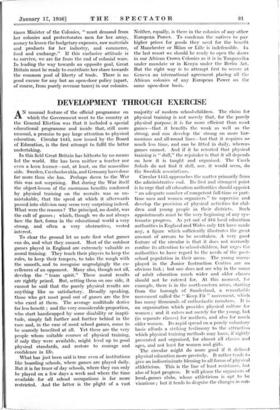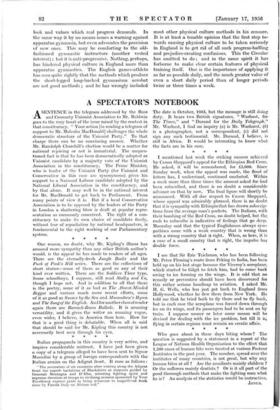DEVELOPMENT THROUGH EXERCISE
- A N unusual feature of the official programme on ZIL which the Government went to the country at the General Election was that it included a special 'educational programme and inside that, still more unusual, a promise to pay large attention to physical education. Circular 1445, now issued by the Board of Education, is the first attempt to fulfil the latter undertaking.
In this field Great Britain has hitherto by no means led the world. She has been neither a teacher nor even a keen learner—not, at least, on the masculine side. Sweden, Czechoslovakia, and Germany have done far more than she has. Perhaps down to the War this was not surprising. But during the War itself the object-lesson of the enormous benefits conferred by physical training on the recruits was so un- mistakable, that the speed at which it afterwards passed into oblivion may seem•very surprising indeed. What were the reasons ? The principal, no doubt, was the cult of games ; which, -though we do not always face the fact, forms in the educational world a very strong, and often a very obstructive, vested interest.
To clear the ground let us note first what games can do, and what they cannot. Most of the outdoor games played in England are extremely valuable as moral training. They teach their players to keep the rules, to keep their tempers, to take the rough with the smooth, and to recognise ungrudgingly the ex- cellences of an opponent. Many also, though not all, develop the " team spirit." These moral results are rightly prized. But, setting them on one side, it cannot be said that the purely physical results are anything like so satisfactory. Broadly speaking, those who get most good out of games are the few who excel at them. The average multitude derive far less benefit ; and the very considerable proportion, who start handicapped by some disability or inapti- tude, simply fall further and further behind in the race and, in the case of most school games, come to be scarcely benefited at all. Yet these are the very people whom suitable courses of physical training, if only they were available, might level up to good physical standards, and restore to courage and confidence in life.
What has just been said is true even of institutions like boarding schools, where games are played daily. But it is far truer of day schools, where they can only be played on a few days a week and where the time available , for all school occupations is far , more restricted. And the latter is the plight of a vast majority of modern school-children. The claim for physical training is not merely that, for the purely physical purpose, it is far more efficient than most games—that it benefits the weak as well as the strong, and can develop the strong on morc har- monious and all-round lines—but that it requires so much less time, and can be fitted in daily, whereas games cannot. And if it be retorted that physical training is -" dull," the rejoinder is that it all depends on how it is taught and organised. The' Czech Sokols do not find it dull, nor, - it would seem, do -the Swedish associations.
Circular 1445 approaches the matter primarily from the administrative end. Its first and strongest point is to urge that all education authorities should appoint " an adequate number of competent full-time or part- time men and women organisers " to supervise and develop the provision of physical activities for chil- dren and young people in their districts. Such appointments must be the very beginning of any sys- tematic progress. As yet Out of 316 local education authorities in England and Wales only 124 have made any, a figure which sufficiently illustrates the great amount of arrears to be overtaken. A very good feature of the circular is that it does not narrowly confine its attention to school-children, but urges the authorities to have regard to the needs of the post- school population in their areas. The young unem- ployed in the Junior . Instruction Centres are an obvious link ; but one does not see why in the name of adult education much wider and older classes should not be catered for. At this moment, for example, there is in the north-eastern areas, starting from the borough of Sunderland, a remarkable movement called the " Keep Fit " movement, which has many thousands of enthusiastic members. It is an organisation which provides physical culture for women ; and it caters not merely for the young, but (in separate classes) for mothers, and also for much older women. Its rapid spread on a purely voluntary basis affords a striking testimony • to the attraction which physical training methods may have, if rightly presented and organised, for almost all classes and ages, and not least for women and girls.
The circular might do more good if it defined physical education more precisely. It rather tends to :give an indiscriminate blessing to all forms of physical athleticism. This is the line of least resistance, but also of Jegst progress. It will please the organisers of local, games clubs, whose athleticism is apt to be vicarious ; but it tends to disguise the changes in out- look and values which real progress demands. In the same way it by no means issues a warning against apparatus gymnasia, but even advocates the provision of new ones. This may be comforting to the old- fashioned gymnastic instructors (another vested interest) ; but it is anti-progressive. Nothing, perhaps, has hindered physical culture in England more than apparatus gymnastics. The English games-athlete has seen quite rightly that the methods which produce the short-legged long-backed gymnasium acrobat are not good methods ; and he has wrongly included most other physical culture methods in his censure. It is at least a tenable opinion that the first step to- wards causing physical culture to be taken seriously in England is to get rid of all such progress-baffling and prejudice-creating confusions. This the Circular has omitted to do ; and in the same spirit it has forborne to make clear certain features of physical training itself. One is the importance of applying it as far as possible daily, and the much greater value of even a short daily period than of longer periods twice or three times a week.







































 Previous page
Previous page